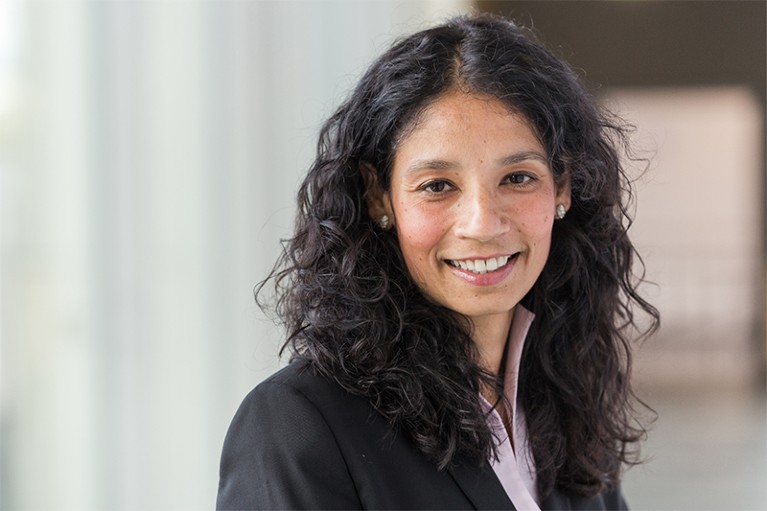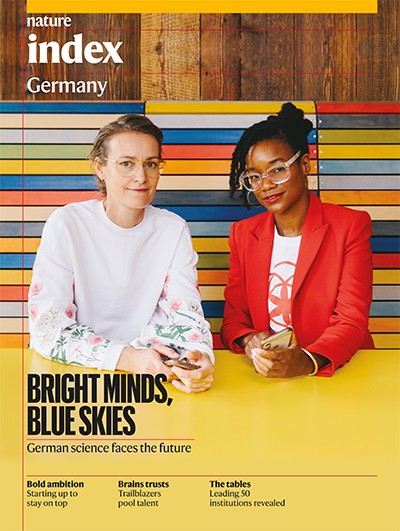
Asifa Akhtar hopes to inspire the next generation of scientists.Credit: MPI of Immunobiology and Epigenetics, Freiburg
Asifa Akhtar stands out in the German scientific community. In July, the Pakistan-born molecular biologist became the first international woman to be named vice-president of the Max Planck Society’s Biology and Medicine Section. Comprising 27 institutes and 7 research facilities, which investigate key aspects of living organisms, including development, perception and adaptation, the Biology and Medicine Section is one of three that form the scientific council of the Max Planck Society, Germany’s highest performing institution in the Nature Index.
A key focus for Akhtar in her new position is ensuring a more diverse cohort of young researchers sits at the forefront of German research. “I’m aware of the responsibility on my shoulders and I take it very seriously,” she says. “I want to show that there are role models who can push things forward.”
A director and senior group leader at the Max Planck Institute for Immunology and Epigenetics in the southwest German city of Freiburg since 2013, Akhtar studies epigenetics, the factors beyond DNA that control gene expression. Using Drosophila flies as a model, her lab has advanced understanding of the regulation of genes on the X chromosome, a key aspect in the development of an organism. In 2019, she co-authored a paper in Nature Cell Biology that clarified the role of specific enzymes in maintaining the integrity of the genome (A. Karoutas et al. Nature Cell Biol. 21, 1248–1260; 2019). Such fundamental research is a core aim of the Max Planck Society, she says.
Akhtar’s research on the regulation of chromatin — a substance made of DNA and proteins that forms chromosomes within the cell’s nucleus — earned her the 2017 Feldberg Prize, given to one researcher in Germany and one in the United Kingdom each year to encourage Anglo–German collaboration in medical and biological science. In 2019, she was elected to the German National Academy of Sciences Leopoldina, the world’s oldest continuously existing academy of natural sciences, founded in 1652 in Schweinfurt, a city in the German state of Bavaria.
Akhtar took on the topic of epigenetic regulation at a time when it was on the verge of major breakthroughs, says Iain Mattaj, former director general of the European Molecular Biology Laboratory (EMBL) in Heidelberg, Germany. She made the most of the opportunity and her timing was excellent, says Mattaj. “In a busy field, she has a history of asking original questions.”
Akhtar hopes her career can serve as an inspiration for other women in German academia. “As a woman, I’ve had extra challenges, and I embrace them,” she says.
According to a 2018 report by the European Commission, women accounted for just 19.4% of senior academic staff in Germany in 2016. Germany was also named as one of a handful of European countries where the difficulty women have in reaching the highest levels of academia increased between 2013 and 2016. “I’m very sympathetic to what the younger generation goes through, because I’ve just been through it myself,” says Akhtar, who urges institutions to continue to invest in childcare and other infrastructure to give early-career researchers a chance to balance work and family life. “I have two children, and the kindergartens at my institutions were lifesavers.”
Akhtar is an advocate for German science, yet could have easily ended up elsewhere. After earning her PhD in genetics at the Imperial Cancer Research Fund (now the Francis Crick Institute) in London in 1997, she considered accepting a position to remain in the United Kingdom or moving to the United States. She opted to complete a postdoctoral fellowship in Germany at EMBL. “An international research institute with outstanding people coming together was very attractive to me,” she says. She launched her first group at EMBL in 2001, and moved to the institute she now directs in Freiburg in 2009.
Akhtar says the German government’s supportive attitude towards research is a major advantage for researchers, including those who come from abroad. “It sees science as an investment in the future. There is a lot of competition, but there is also a sense of stability that drives scientists to go forward. If you can get exposed to German science at any stage of your career, it’s fantastic.”
Ultimately, Akhtar sees her new leadership role as more than a validation of her own work. For her, it’s a sign of progress. “The new cohort of vice-presidents at the Max Planck Society is younger than the one before it,” she says. “It shows that the society is dynamic and moving forward. It sees the challenges that are in front of us.”


 German science is thriving, but diversity remains an issue
German science is thriving, but diversity remains an issue
 How Germany retains one of the world’s strongest research reputations
How Germany retains one of the world’s strongest research reputations
 Germany’s start-up scene is booming
Germany’s start-up scene is booming
 German science on the world stage: visualized
German science on the world stage: visualized
 Clusters of Excellence: the new ‘brains trusts’ of German science
Clusters of Excellence: the new ‘brains trusts’ of German science








